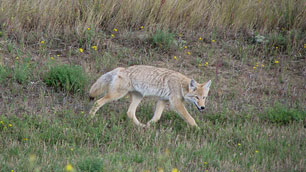Time to put coyotes off their appetite?
'Taste aversion' could deter predators from eating cows, sheep: biologist
Last Updated: Wednesday, August 11, 2010 | 3:14 PM ET
CBC News
 A coyote prowls the Saskatchewan prairie somewhere between Kerrobert and Kindersley. More than 70,000 of them were killed under a provincial bounty program over the past year. (Submitted by Vera Csada)
A coyote prowls the Saskatchewan prairie somewhere between Kerrobert and Kindersley. More than 70,000 of them were killed under a provincial bounty program over the past year. (Submitted by Vera Csada)Saskatchewan has a serious problem with predators eating livestock, but what if ... they simply didn't feel like eating?
"Taste aversion" could be the answer to making wolves and coyotes leave cows and sheep alone, says John Polson, a freelance wildlife biologist and beekeeper.
The idea is to leave bait laced with a chemical that makes a predator sick, but only for a few minutes, says Polson, who is based in Saskatoon and has a bee farm close to the city.
For instance, the predator eats beef with a nausea-inducing chemical, becomes sick and loses its taste for cattle.
Over the past year, more than 70,000 coyotes were killed under a provincial bounty program that a number of farm groups supported. However, some wildlife experts questioned its effectiveness.
Taste aversion could be an alternative to the idea that "the only good coyote is a dead coyote," Polson said.
"Actually, the only good coyote is one that doesn't eat your sheep," he said.
Polson said provincial Environment Ministry officials have contacted him about his research, and while it's too early to say if it will be adopted, he thinks it's worth testing.
In addition to the livestock industry, taste aversion could also find application in Saskatchewan's honey industry, he said.
Bear problem getting worse
Calvin Parsons, who farms bees near Melfort, says electric fences work well for bear control, but the problem's getting worse.
"I kept bees here for 20 years before I had a bear problem. Now I have three-quarters of my yard fenced," Parsons said. "It's just gotten that bad."
Parsons said he's open to using taste aversion to keep bears away from his honey. It's an approach that could help bee farmers around the globe, Polson said.
"There are beekeepers across the world and they are all having the same problem," he said.
